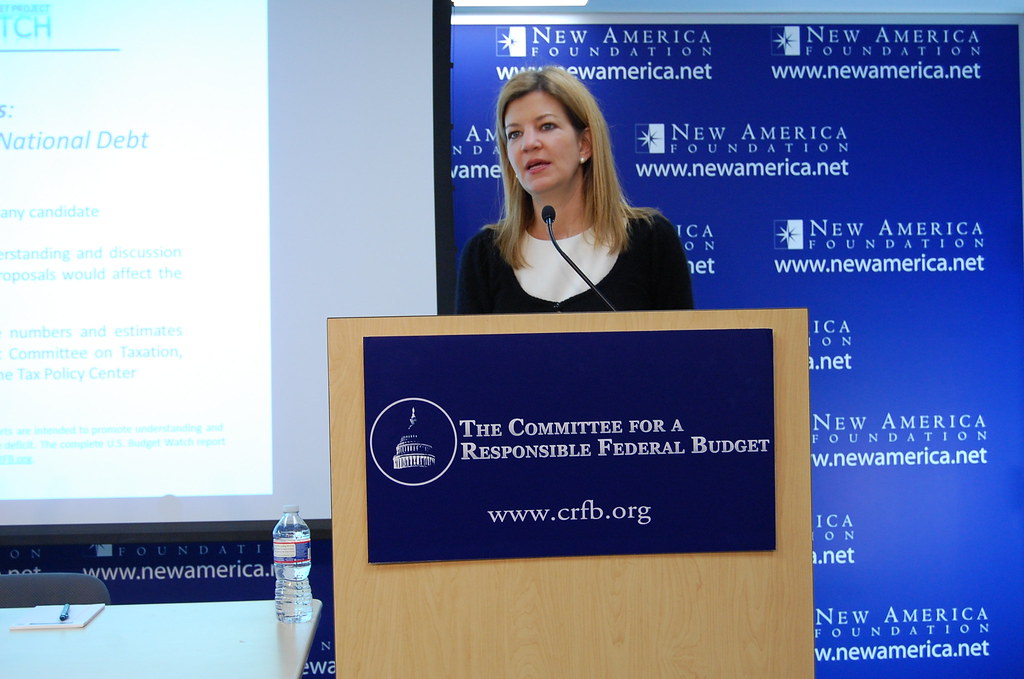The week after his electoral victory, President-elect Trump formally announced the creation of the Department of Government Efficiency (DOGE). The acronym DOGE is a reference to the cryptocurrency dogecoin, a “digital currency” that he has invested “a bunch” of money into and a meme Elon Musk is crazy about. In actuality, DOGE is neither a government department—incorporation as a department would require congressional oversight and (presumably) a Senate-confirmed head—nor seriously dedicated to efficiency. Really it’s a commission set up to advise the president around what to include in his budget proposals (and a post from which the richest man in the world can grift the federal government).
Enter the Committee for a Responsible Federal Budget, a supposedly respectable DC thinktank who issued a statement lauding the creation of DOGE. In particular, CRFB President (and Hackwatch notable) Maya MacGuineas said “We welcome the creation of a new entity to get under the hood of the federal government and look for ways to reduce inefficiencies and generate fiscal savings.”
Nevermind that neither Elon Musk nor his partner in crime (hopefully only metaphorically), Vivek Ramaswamy, has any expertise in government accounting and obviously don’t know what they’re doing. Or that it is literally, of its own accord, a meme. Nevermind that both leaders have made ridiculous claims like Musk saying he thinks he can cut $2 trillion (in only 6 months) or Ramaswamy salivating over a plan to “delete” entire federal agencies. Nevermind, that, as proposed, the entire thing might be illegal. Or that Elon Musk is apparently soliciting applications to work for the federal government via Twitter DM (and requiring anyone interested pay him (read: bribe him) $8 a month for the privilege of applying).
CRFB loves the idea. Just look at what they said:
- They (unironically) believe DOGE “could help improve the public’s faith in government.”
- “It will take an all-hands-on-deck approach to fix our fiscal situation, and this effort could make a tremendous contribution.”
- The release closes with “look[ing] forward to the DOGE’s recommendations.”
Really? There are about a million alarm bells that should be going off around DOGE. As my colleague Timi put it in a recent piece for The American Prospect, in light of what we’ve seen, “One wonders if Musk and Ramaswamy have even a passing familiarity with the federal budget.”
The same day that CRFB published their statement, Elon Musk’s America PAC gave us a glimpse into the kind of budget hawking the nation is in for when they tweeted a list of “waste.”

There is so much wrong with this type of waste-hunting. For one, two-thirds of the total waste identified is actually interest payments on the national debt ($659 billion out of $900 billion). But also, what kind of accounting is “part of $800 [billion]?” And they do the same thing on several other lines too!
They’ve also singled out one expense that is $8,000 (out of a total annual federal budget of $6.75 Trillion). The equivalent expense for a household budget of $100,000 would be 0.011 cents. DOGE will probably have to spend that much just to get documentation on that specific line item. So much for efficiency.
The entire concept of DOGE is just goofy. But hey, it’s nice that CRFB is excited for the guy who turned Twitter into a racist caricature of itself to run the same kind of cost-cutting program he did there to our federal government. That this was a farce was obvious. That America PAC literally demonstrated that right while DOGE was being graced by MacGuineas’ blessing is really funny.
In the end, it’s not that surprising; CRFB has a history of flattering Republicans and trying to gut social spending. They even do it in their release in this paragraph:
Such an effort should look at all parts of the budget, especially in the areas of health care, national defense, and spending through the tax code, and it should look beyond just cutting fraud and reducing bureaucracy to also identify places where the taxpayer is not getting the best value for their dollar. Federal health care spending, in particular, is rife with overpayments and inefficiencies that offer the opportunity to substantially lower costs without meaningfully reducing quality or access to care. The drivers of the growth in primary spending are Social Security and federal health care programs – namely Medicare.
Notice how they pay lip service to things like national defense and tax-code spending, but then pivot hard into Medicare and close on that and Social Security as the problem areas?
Welcome to the new Trump administration, where apparently this is what we can expect from the “responsible moderates” like CRFB.
Image Credit: “Maya MacGuineas” by New America is licensed under CC BY 2.0.

